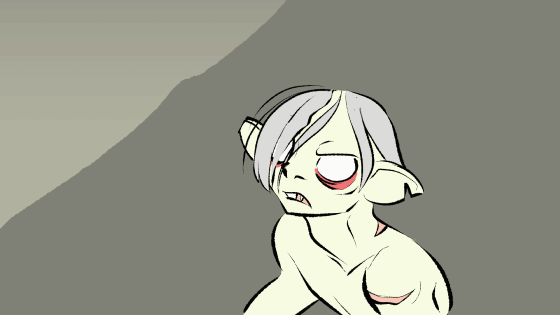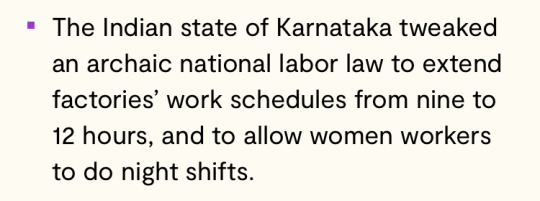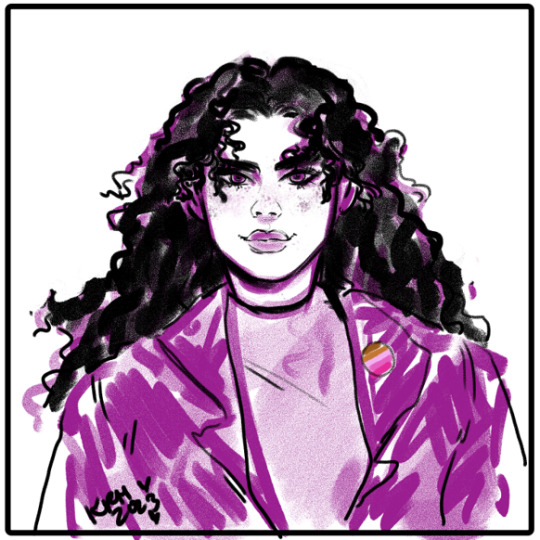#Involuntary commitment
Note
What would your reaction be to a pilot program confining male comedians to safe asylums until they prove they are safe to interact with women and kids? Ideally they would be able to perform under guard and psychiatric supervision, and after a period of years a panel of social workers, doctors and women from the community would assess their compatibility with society at large.
Which males are those? Black? Brown? Indigenous? Undocumented immigrant? Muslim? Disabled? Mentally ill and neurodivergent? Queer? Trans men? Unhoused and poor? All of those men already get arbitrarily thrown in what you euphemistically call "safe asylums" because their very existence is seen as dangerous to women and children. It's why I'm a prison abolitionist. And now you want to add the crime of making bad jokes?
See where it says "Radfems DNI" on my bio? That means clowns like you who send me asks like this. Even if you meant it as a joke, this entire premise is grossly ableist, and pathologizing half the human population frankly unhinged. Take your white female victim complex and GTFO.
#read some bell hooks and Foucault and maybe you'll calm down#asks#anon#anti radfem#misandry#white women#involuntary commitment#prison abolition#intersectional feminism#tw ableism#tw sanism#knee of huss
704 notes
·
View notes
Text
The UCP is considering a law that would force people with severe drug addictions to be placed into treatment without their consent, according to documents obtained by The Globe and Mail.
The Compassionate Intervention Act would be the first involuntary treatment law in Canada to target addiction.
Some jurisdictions, including Alberta, already use mental health laws to push people into drug treatment without court orders in exceptionally severe situations.
The Globe says this legislation would give police, as well as the family or legal guardian of drug users, sweeping rights to refer adults and youth to involuntary treatment if they pose risks to themselves or others.
Full article
If this becomes the law, it will be a huge loss of human rights for people that experience addiction. This further removes freedom and bodily autonomy from a group that is already pushed to the margins of society.
Involuntary commitment is a horrible concept that is already used to imprison mentally ill people against their will, and expanding it to include people experiencing addiction makes a bad situation worse.
Make no mistake, this will disproportionately impact people of colour and lgbtq+ people.
(commentary by Samira, @politicsofcanada )
#cdnpoli#canadian politics#canadian news#canadian#canada#alberta#UCP#conservatives#addiction treatment#drug treatment#involuntary drug treatment#involuntary commitment#addiction#drugs#addiction tw#drugs tw#needles tw
292 notes
·
View notes
Text
my experience at a mental hospital
Being involuntarily held in a mental hospital can be a frightening, uncomfortable experience. I want to share my experiences at a mental hospital in hopes that, if this ever happens to you, you will hopefully know what to prepare for.
(Note: Every hospital is different and will vary depending on your location, state, country, etc.)
They should give you a booklet that lists all your rights as an involuntary patient. Try to familiarize yourself with these rights.
Phones, watches, and other electronics are generally not allowed. Hoodie/sweatpants strings and shoe laces are also not permitted and will be removed.
Upon admission they may strip search you, to check for scars or smuggled items. They say it’s for safety, but it’s degrading as hell.
They will probably take your blood when you get there, in case they have to prescribe you medication.
You will see a psychiatrist while there. Be honest about your symptoms and try not to mask. The more authentic you are to them, the more they can help you.
They may ask you odd questions, like who the president is, where a certain item in your house is, what month it is, or ask you to spell words backwards. This is to check your orientation and cognitive abilities.
Most hospitals will have group therapy or activity sessions. It’s not necessary to attend these, but they are beneficial.
You might have a roommate and they might be weird. I say this as someone who was the weird roommate. You can ask staff to switch rooms if you feel unsafe.
Staff routinely checks on you roughly every 15 minutes. It can be annoying especially if you want privacy. Bonus points if they shine a flashlight in your face while trying to sleep.
They will check your vitals every morning, usually quite early in the morning. Try not to be put off by the machinery, which might seem scary during an episode.
It’s cold af. I don’t know why mental hospitals are so cold, but you can always ask the staff for extra blankets.
If you have allergies or dietary restrictions, let them know and they will offer you the proper food. I was able to ask for vegetarian options.
It is incredibly boring at a mental hospital. Keep your self entertained with whatever they have to offer, and take advantage of the limited outdoor time they provide you.
Don’t be afraid to ask the front desk for toiletries, menstrual products, grippy socks, clean underwear, etc. You can also ask for earplugs if things get noisy or disruptive.
They will do your laundry, but don’t expect to get your clothes back. My roommate lost all her clothes after they collected it for laundry. It’s better to wear their hospital gowns.
Try not to be put off by the other patients who might exhibit strange or violent behaviors. Unless they are a direct threat or danger to you, it’s best to just ignore them.
Remember that not the end of the world if you have to be hospitalized. It’s not indicative of a personal failure and it doesn’t make you a bad person. Mental hospitals aren’t perfect, but they exist to help stabilize people during a crisis. Don’t feel bad for needing help.
#mental health#mental heath support#mental hospital#psychiatric hospital#involuntary commitment#what to expect at a mental hospital#long post
26 notes
·
View notes
Text
Why No Non-Consensual Active Rescue? | Trans Lifeline
Beyond the risk of harm from law enforcement, non-consensual active rescue poses several other risks for our community. Young callers frequently share that they have experienced non-consensual active rescue after sharing suicidal ideation with another support line. Many of these young people are not out to their families, and the active rescue effectively makes the decision for them, which can result in abuse, rejection, and on some occasions, sudden and unexpected homelessness.
Hospitalization following active rescue can add an additional layer of risk. Around one-third of trans people (about twice as much as the general population) live below the poverty line. For many callers, being charged for an ambulance or hospital bill can make the difference between survival and being out on the street. Depending on where a caller lives, a history of involuntary commitment can also preclude them from receiving gender-affirming medical treatment (such as surgery) in the future, or greatly decrease their chances.In looking at suicidality and risk factors specific to our community, we find that some of the most prominent factors that contribute to ongoing suicidality are alienation, transphobic treatment (especially by people in positions of power, helping professions, or family), perceived burdensomeness, lack of access to material resources, and being barred from medically transitioning or living authentically in one’s affirmed gender. When we compare these factors to the risks posed by non-consensual active rescue, we see that they overlap. In other words, were we to engage in non-consensual active rescue, we could increase the suicidality risk factors for a caller.
#Non-consensual active rescue#Tw suicide#victim blaming#Transphobia#Hostility to bodily autonomy#Involuntary commitment
78 notes
·
View notes
Text
1/2/24
One of my patients tried to strangle one of my other patients today.
I wrote about two patients yesterday. One guy who's struggling, and another guy who I didn't have time to write about but wanted to write about, who's also struggling. Well as luck would have it, I had them both as patients today again, and one of them tried to strangle the other.
Today was a goddamn saga. I don't know what else to say about it, other than that "I have no time to write about it, because my god, it was a saga. I just have to commit to doing it tomorrow, since tomorrow is my day off.
Here, okay, I'll write about this other thing instead real quick. So, I've had this guy on my unit for four and a half months, who I've written about in this journal occasionally. Well, this morning one of the night nurses told me "Hey! We got news that that patient is discharging tomorrow! The long fight for placement is finally over!" And she gave us all these details about transport plans and the location. I mentioned it to my supervisor, she was happy to hear it. I mentioned it to the patient and the guy had no idea what I was talking about but was happy to hear he was leaving soon. I get a call from my supervisor, she says "I just spoke to the caseworker manager. She has no idea what you guys are talking about. There are no plans in place to discharge that patient tomorrow." Ended up getting this guy's fucking hopes up. God damnit all.
That's nothing, though. Whatever I write up tomorrow is going to be long.
#dear diary#diary entry#nursing#psych#psychiatry#psychosis#nurse#schizophrenia#cw: violence#involuntary commitment
2 notes
·
View notes
Text

Or they'd offer you some jello.
5 notes
·
View notes
Text
One Instagram post said, "988 is not friendly. Don't call it, don't post it, don't share it, without knowing the risks." The post, which had garnered nearly a quarter of a million likes as of early August, went on to list the risks as police involvement, involuntary treatment at emergency rooms or psychiatric hospitals, and the emotional and financial toll of those experiences.
Other posts on Instagram and Twitter conveyed similar concerns, saying that the hotline sends law enforcement officers to check on people at risk of suicide without their consent and that people, especially from LGBTQ+ communities and communities of color, may be forced into treatment.
. . .
"I realize there is an urge to rescue people in crisis, but the reality is the services that exist make the problem much, much worse," said Winston, who works in mental health peer support and has started an online support group for people recovering from involuntary treatment.
Research shows suicide rates increase drastically in the months after people are discharged from psychiatric hospitals. Those who were sent involuntarily are more likely to attempt suicide than those who chose to go, and involuntary commitments can make young people less likely to disclose their suicidal feelings in the future. Some people also get stuck with large bills for treatment they didn't want.
Emily Krebs, a suicide researcher and assistant professor joining Fordham University this fall, said that involuntary treatment is viewed as a necessary part of suicide prevention in the U.S., but that other countries don't see it that way. The United Nations has called forced mental health treatment a human rights abuse and asked countries to ban it.
. . .
"Warm" lines are one option. They're typically staffed by "peers," people who have experienced mental health challenges. They focus less on crisis intervention and more on emotional support to prevent crises. You can find a directory of warm lines by state here.
Below are other hotlines and resources. This is not a comprehensive list, and some resources may limit their services geographically.
Blackline is a hotline geared toward the Black, Black LGBTQ+, brown, Native, and Muslim communities
Kiva Centers offers daily online peer support groups
M.H. First Oakland and M.H. First Sacramento operate during select weekend hours in the California cities of Oakland and SacramentoPeer Support Space hosts virtual peer support groups twice a day Monday through SaturdayProject
LETS provides support by text for urgent issues that involve involuntary hospitalization
Samaritans of New York is a hotline based in New York CityTrans Lifeline is a hotline for trans and questioning individuals
Wildflower Alliance has a peer support line and online support groups focused on suicide prevention.
Links for above in the article.
Excerpts:
The turn away from confidentiality toward surveillance and datafication has been met with widespread criticism on other fronts. Just recently, Crisis Text Line, a nonprofit SMS-based suicide prevention program, received an outpouring of outrage after users found it was profiting off the data generated by those in crisis; the Federal Communications Commission went so far as to demand Crisis Text Line cease the practice. It did so almost immediately (and now the FCC has called on the Federal Trade Commission to investigate), but Crisis Text Line remains, as so many other hotlines do, in partnership with the police. Even after the protests to defund police departments and to remove police from mental health care in summer 2020, even after the World Health Organization and U.N. Office of the High Commissioner for Human Rights called for an end to forced treatment, crisis lines and police departments continue to cooperate.
We know that police violence, criminalization, and forced treatment are racialized. If historically suicidality has been understood as a white, adult, male mental state, in our contemporary moment, this is no longer the case. The fastest-growing demographic of suicidality is now Black youth ages 10 to 19, with attempts up 73 percent since 1991, while attempts among white youth declined in the same period. Meanwhile, interaction with the police while in crisis increases suicidality at the individual level and decreases trust in hotlines at the community level. Where will Black callers—and others—turn next time?
By only contracting with providers that use nonconsensual intervention, 988 guts the confidentiality that has long been a core feature of the hotline, while increasing surveillance on the most targeted and vulnerable in our communities. Not every hotline currently puts its callers at greater risk. Trans Lifeline, BlackLine, Samaritans, DASHR, MH First Oakland, and many others continue the legacy of early crisis care work, as do others not gathered under the NSPL network. They find that, for their callers to trust them and therefore receive the help they need—and only that help—the threat of nonconsensual intervention must be off the table or at least much further down the list.
4 notes
·
View notes
Text
With a living will, you can decide not to be ventilated or not to receive blood transfusions; in other words, you can make a legally binding decision to die.
On the other hand, a living will cannot prevent you from being involuntarily hospitalized. You can prohibit any type of medical treatment, but not hospitalization per se.
Can someone please explain to me why this makes any sense at all?
#cen#childhood emotional neglect#low self-worth#mental illness#therapy#psychiatry#antidepressants#psychiatrists#hospitalization#psych ward#depression#living will#involuntary commitment
1 note
·
View note
Text
sjm is actually hilarious for having the inner circle give Nesta a choice between being imprisoned at the HoW or straight deportation during their “intervention” could you imagine for a second if social services showed up at your door like whelp. you failed your wellness check. you can either go to this inpatient facility or option number two, mexico,
#it would be Mexico too#not that Nesta was doing anything to actually warrant involuntary commitment to their version of rehab#like did she break any laws#no#disturb the peace? just rhysand and feyres#pro nesta archeron#pro nesta#sjm critical#nesta deserves better#a court of silver flames#anti acosf#carly’s anti rhysand manifesto
99 notes
·
View notes
Text

animation practice. I very much see issues but would like to move on and declare this finished- it fulfilled its purpose of 'How would it look if I tried [x thing]'
#blobart#gollum#I said to myself#what if you were to double down on the third eyelid thing. commit to the bit. well#cartoon characters usually all blink while they're holding on an expression/not moving to prove they're not dead. however#he wouldn't blink as often if his eyes were already sort of closed now would he#if only there was some other subtle involuntary motion that this specific character is known to frequently do
71 notes
·
View notes
Text


FOR FREE???????????????????
#I NEED TO STOP LOOKING AT STUFF IN THE OFFICE BATHROOM BEFORE MY COLLEAGUES GET ME INVOLUNTARY COMMITTED FR#jimmy jitaraphol#sea tawinan#jimmysea#m: txt
129 notes
·
View notes
Text

I roll my eyes at a lot of “passive voice is propaganda” theorising but I absolutely endorse a similar thesis about the way labour regulations get reported on. Labour rules prohibiting overnight shifts for women (or whatever) are not imposing sanctions on the workers doing the work, they’re imposing sanctions on the employers extracting that work. Duh!! Calling this a ban on women working overnight shifts is like calling homicide laws a ban on being murdered
#similar feelings about ‘right to die’ rhetoric#in jurisdictions where (as is sane) suicide itself is not criminalised#and where the topic is not involuntary commitment
56 notes
·
View notes
Text


my gal calliope in her regular fit and her nurse scrubs!!! done by @crownedinmarigolds thank you so much they’re so amazing!!!
#you totally didn’t have to do the second one thank you so much!!#calliope ismene#calliope in her cute lil nurse scrubs committing involuntary euthanasia on hospice patients#AHHHHH#like 5 people from the discord server i’m in got commissions too LMAO#vtm#vampire the masquerade
30 notes
·
View notes
Text
what does grizzly put in his fucking characters man -_-
#EVIL AND FUCKED UP. 2 FOR 2 SO FAR. trying 2 get ready for bed however i am thinking about. arthur bennett. gross. hate that guy hes so sad#and lame. boooo. we hate your loser meow meow bitch ass pussy and involuntary guardianship of twins who keep getting in Situations. and#your gay little flask. going 2 steal ur kitycat butler. i need 2 shake him around a dog w/ a toy.#...#suck lb#...how could i not. its such a funny bit 2 commit to.
3 notes
·
View notes
Text
Update on My Legal Situation
I'm still waiting for the wheels of justice to turn. I did learn yesterday that I may need to hire yet another lawyer (three!) to handle a specific piece of my situation. That's vague, but so it goes with most things legal. I can't give you details without permission. It may be quite a doozy. One solidly good thing is that over 150 people have donated to this crowdfund. You believe in me, you are showing up for me. That's tangible evidence I can cling to when I'm overwhelmed and frustrated. I appreciate that so much. I don't have much family at all so feeling supported is not my baseline. And I must admit that I think a lot about all of the peope who don't have this support or investment in a basic family law attorney. What happens to them?
#blogger#blog#blogging#crowdfun#gofundme#venmo#paypal#cashapp#support#invest#fyp#attorney#PFA#Involuntary civil commitment#mental health#lgbtq#lesbians
8 notes
·
View notes